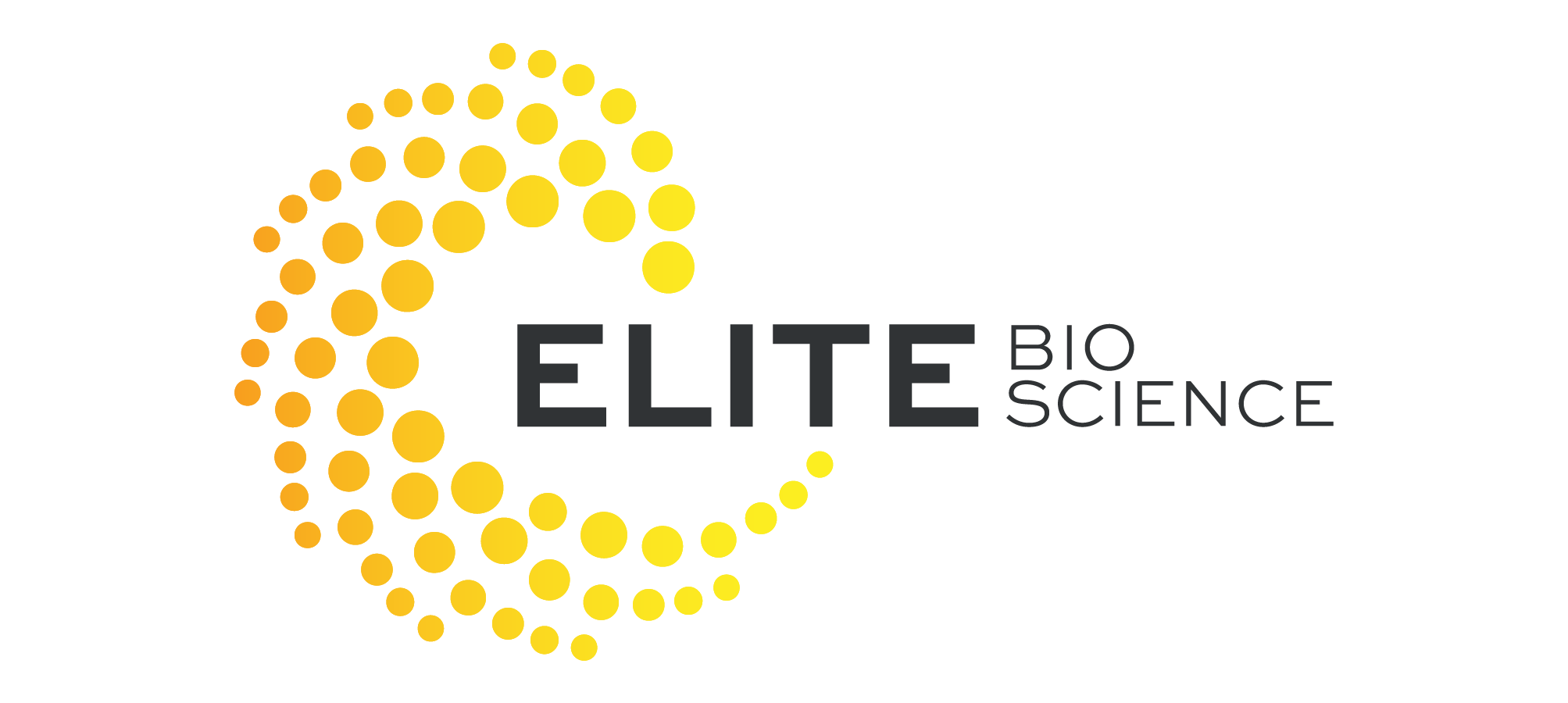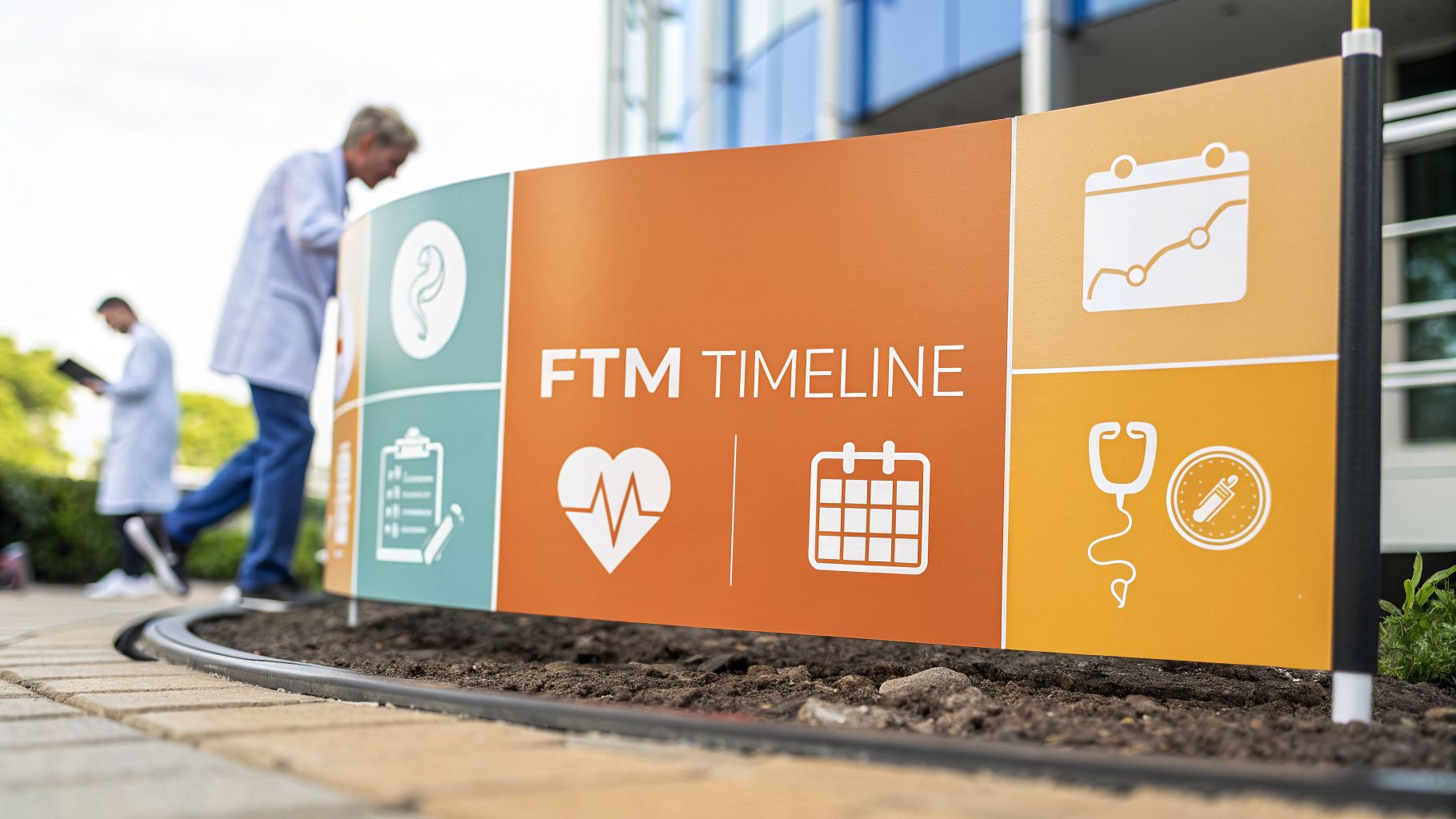8 Natural Ways to Boost Collagen for Youthful Skin in 2025
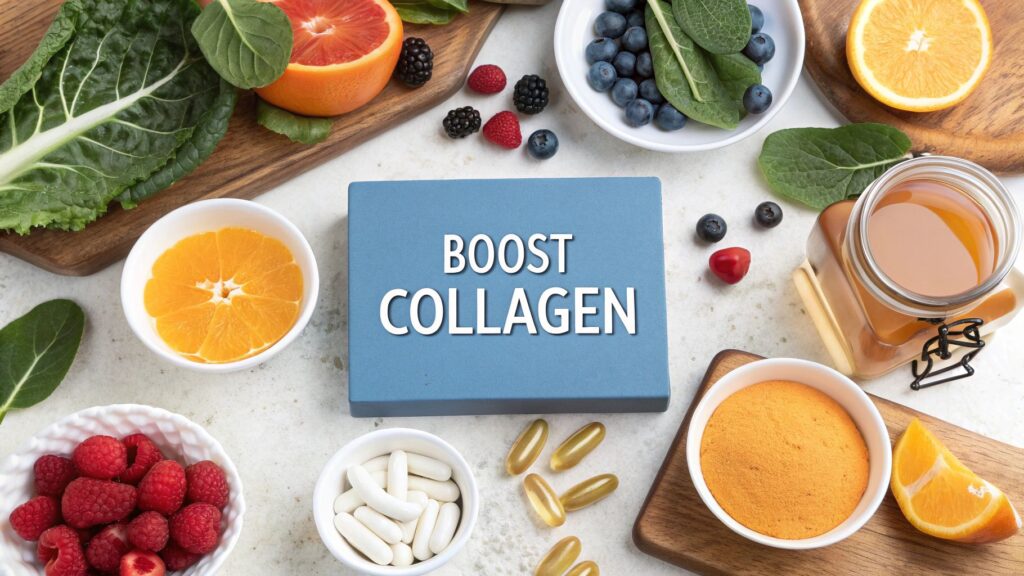
Collagen is the essential structural protein that gives our skin its firmness, plumpness, and youthful elasticity. As we age, its production naturally declines, a process that leads to the common signs of aging such as fine lines, wrinkles, and sagging skin. While the beauty industry offers countless topical solutions, the most powerful and sustainable methods for revitalization are often found in nature and our daily habits.
This guide provides a comprehensive blueprint of evidence-based, natural ways to boost collagen production from the inside out. We will move beyond surface-level advice to detail how specific foods, targeted nutrients, ancient wellness practices, and modern lifestyle adjustments can work together to protect and enhance your body's collagen framework.
You will learn actionable strategies that not only improve your skin's appearance but also contribute to your overall health and vitality. Prepare to discover how to support your body's innate ability to produce this crucial protein, empowering you to reclaim a radiant and resilient complexion.
1. Harness the Power of Vitamin C-Rich Foods
Vitamin C, or ascorbic acid, is a non-negotiable component in your body's collagen production process. Think of it as the master key that unlocks collagen synthesis. This essential vitamin is a critical cofactor for two enzymes responsible for stabilizing and strengthening the collagen helix, a process known as hydroxylation. Without sufficient vitamin C, the entire production line for creating strong, healthy collagen can slow down significantly, impacting skin elasticity, joint health, and tissue repair.
This makes integrating vitamin C-rich foods one of the most effective natural ways to boost collagen. It not only provides the raw materials needed for new production but also acts as a potent antioxidant, helping to protect your existing collagen from degradation caused by free radicals and environmental stressors like UV radiation and pollution.
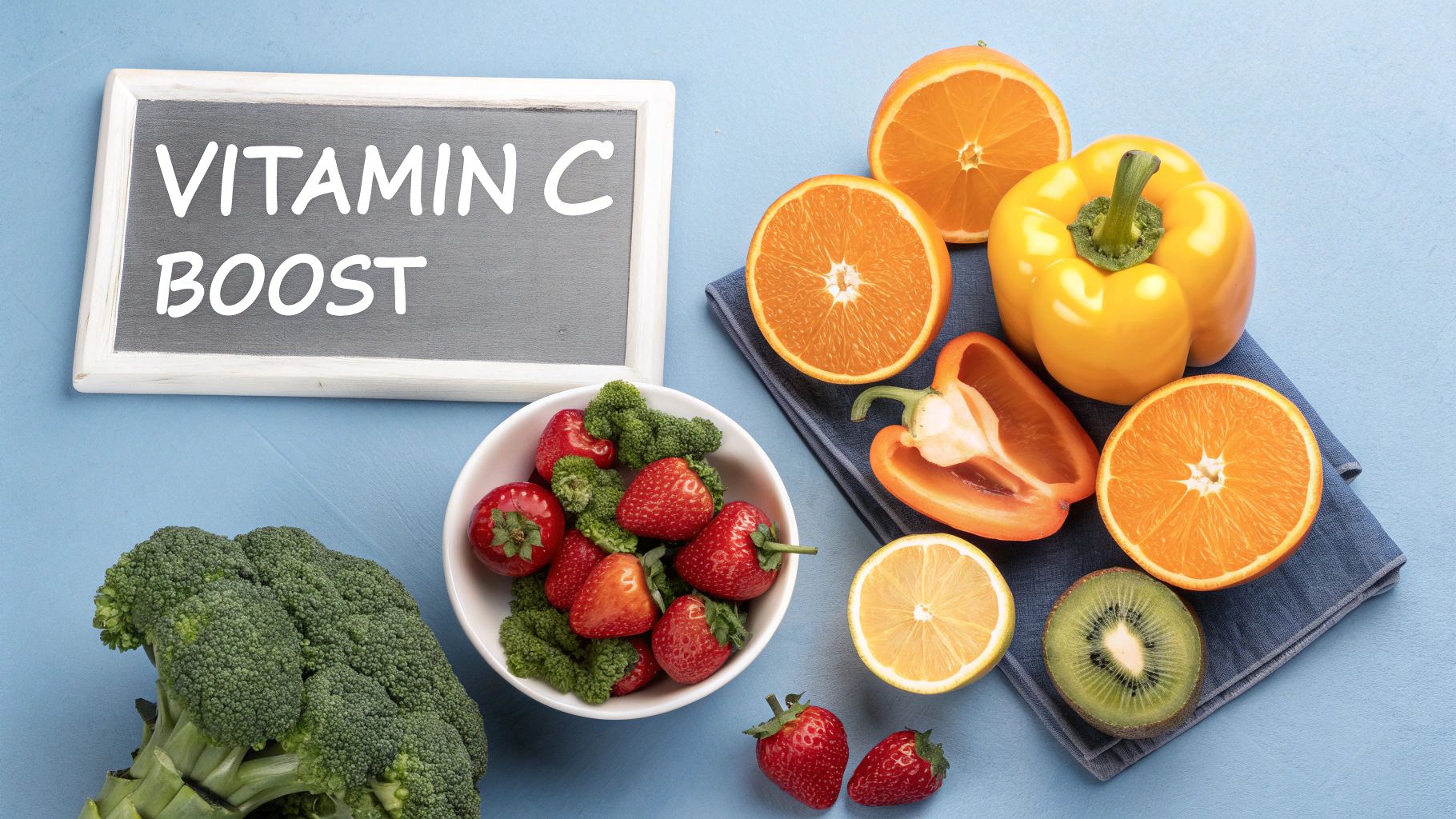
How to Implement This Strategy
Prioritizing vitamin C is straightforward and delicious. Focus on incorporating a colorful variety of fruits and vegetables into your daily meals.
- Citrus Power: Start your day with oranges or grapefruit. A single medium orange provides nearly a full day's worth of vitamin C.
- Berry Delicious: A cup of strawberries not only satisfies a sweet tooth but also delivers around 85mg of vitamin C.
- Vibrant Veggies: Red bell peppers are a surprising superstar, offering more vitamin C than most fruits. A single cup can provide well over 100% of your daily needs.
- Go Green: Cruciferous vegetables like broccoli and kale are excellent sources. A cup of cooked broccoli contains roughly 80mg.
Key Insight: To maximize nutrient absorption, consume these foods raw or lightly steamed. High-heat cooking can degrade vitamin C content, reducing its effectiveness.
For individuals seeking maximum absorption and targeted support, such as athletes in recovery or those focused on intensive anti-aging protocols, direct vitamin therapies can be highly effective. These methods bypass the digestive system, ensuring 100% bioavailability. To explore professional-grade options, you can research vitamin therapies available at wholesale prices. A food-first approach is fundamental, but for enhanced results, direct supplementation ensures your body has the optimal levels required for robust collagen synthesis.
2. Bone Broth Consumption
Consuming bone broth is a time-honored practice for directly supplying your body with the building blocks of collagen. This nutrient-dense liquid is created by simmering animal bones and connective tissues for an extended period, a process that breaks down these components into an easily absorbable form. The resulting broth is rich in gelatin, collagen, and crucial amino acids like glycine, proline, and hydroxyproline, which are the primary components needed for your body to synthesize its own collagen.
This makes regular bone broth consumption one of the most direct natural ways to boost collagen. Instead of merely providing cofactors like vitamin C, you are delivering the raw structural materials themselves. This approach supports not just skin elasticity but also gut health, joint function, and tissue repair, making it a holistic strategy popularized by functional medicine practitioners and wellness experts like Dr. Kellyann Petrucci.
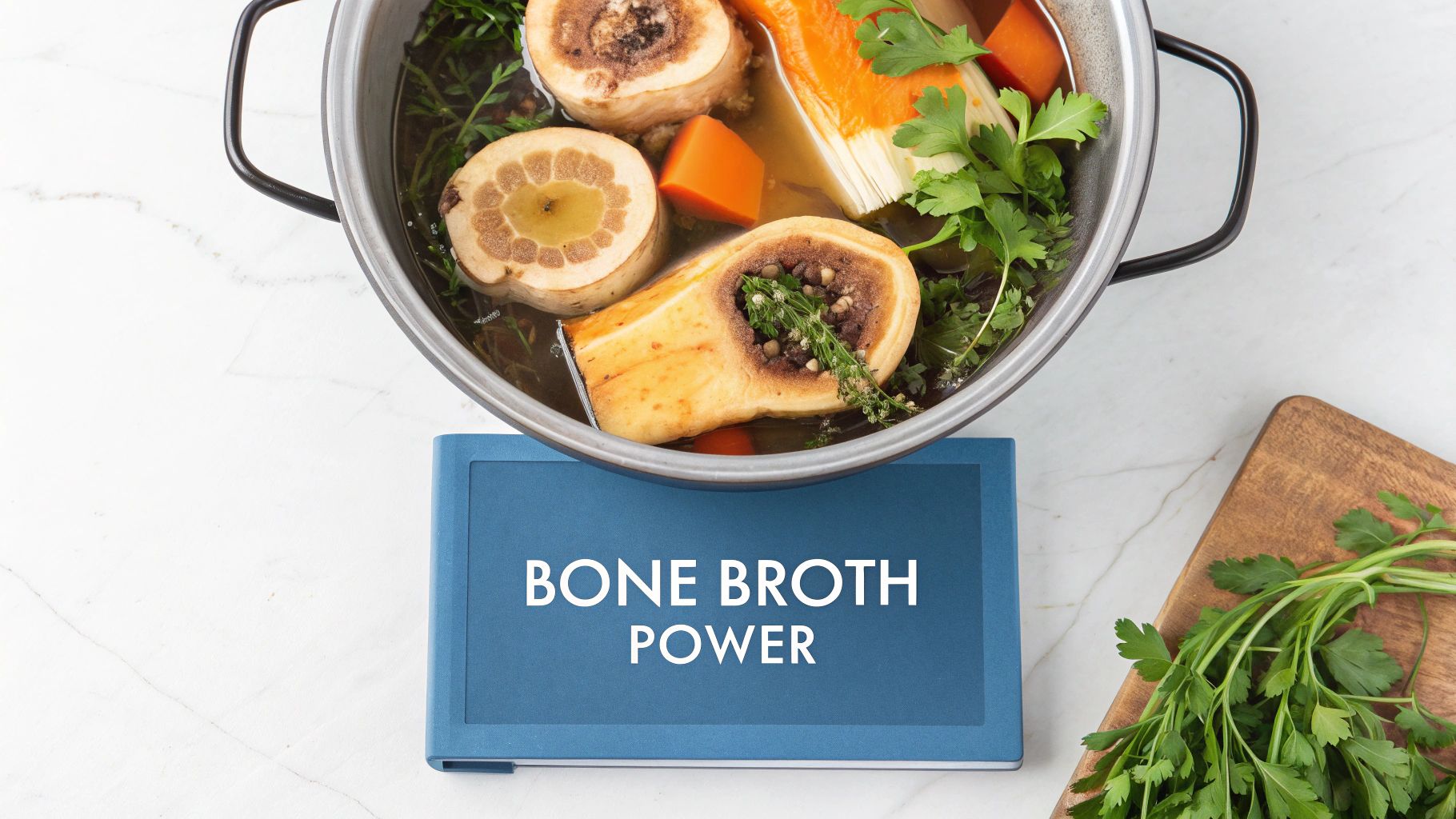
How to Implement This Strategy
Incorporating bone broth into your routine is simple, whether you choose to make it yourself or purchase a high-quality commercial version. Many athletes use it for recovery, while paleo and keto followers often make it a daily staple.
- Make Your Own: Simmer grass-fed, organic bones (beef, chicken, or fish) for 12-24 hours. Adding a splash of apple cider vinegar can help extract more minerals from the bones.
- Convenient Options: Brands like Kettle & Fire and Pacific Foods offer high-quality, pre-made organic bone broths, saving you significant time.
- Easy Portions: When making a large batch at home, freeze the broth in ice cube trays for convenient, single-serving portions to add to soups, stews, or to sip on its own.
- Daily Ritual: Start or end your day with a warm mug of seasoned bone broth. This is a common practice in many wellness protocols, including those from chef Marco Canora who helped popularize broth bars.
Key Insight: The quality of the bones directly impacts the nutritional value of the broth. Always opt for bones from grass-fed, pasture-raised, or organic sources to avoid exposure to antibiotics and hormones and to ensure a richer nutrient profile.
3. Embrace Collagen-Supporting Herbs like Gotu Kola & Horsetail
Beyond vitamins and minerals, the plant kingdom offers powerful allies for collagen health. Certain herbs contain unique bioactive compounds that support collagen production and protect existing fibers from damage. Two standouts in this category are gotu kola and horsetail, both celebrated in traditional medicine for their restorative properties. Gotu kola contains asiaticoside, a triterpenoid that has been shown to stimulate collagen synthesis, while horsetail is a potent source of silica, a trace mineral that acts as a crucial cross-linking agent to strengthen collagen and improve skin elasticity.
Harnessing these botanicals is one of the most sophisticated natural ways to boost collagen. They work not just by providing building blocks but by actively signaling to your body to enhance its own production and preservation mechanisms. This makes them a valuable addition to a holistic anti-aging and tissue repair strategy, addressing collagen health from a unique biochemical angle.
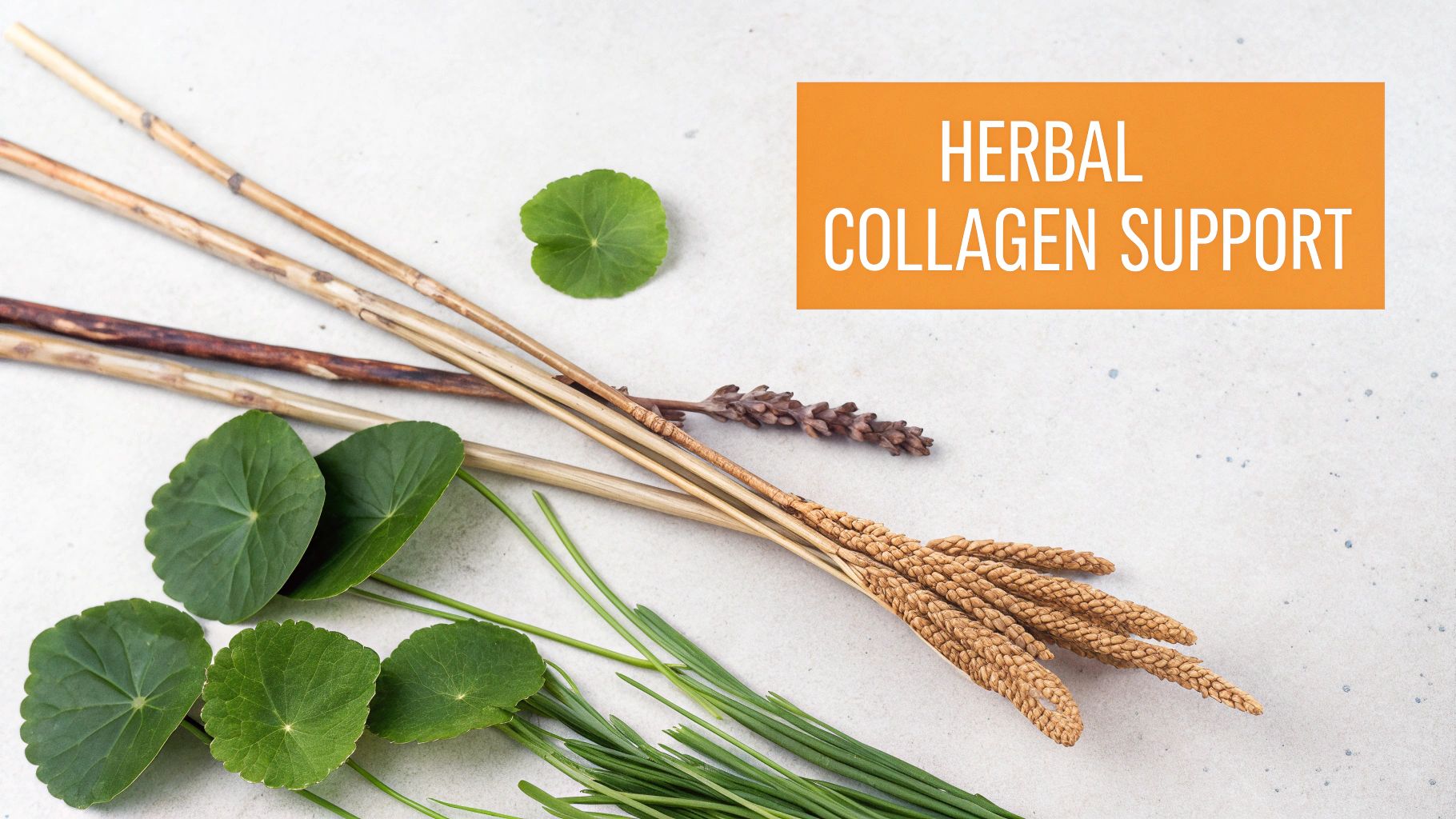
How to Implement This Strategy
Incorporating these herbs can be done through teas, tinctures, or encapsulated supplements, depending on your preference and desired potency.
- Gotu Kola (Centella asiatica): Used for centuries in Ayurvedic medicine to promote wound healing, you can find gotu kola in teas or as a standardized extract in capsules. Modern skincare brands also frequently feature it in creams and serums for topical application.
- Horsetail (Equisetum arvense): Traditionally consumed as a tea in Europe for its high silica content, horsetail is excellent for supporting skin, hair, and nail strength. Look for it in herbal tea blends or as a liquid tincture.
- Synergistic Blends: Many Traditional Chinese Medicine and Western herbal formulas combine these herbs with others like nettle or oat straw to create a more comprehensive effect on connective tissue health.
Key Insight: For medicinal use, consistency is crucial. Choose standardized extracts when possible to ensure you are receiving a consistent and effective dose of the active compounds like asiaticoside in gotu kola or silica in horsetail.
While a food-first approach is foundational, these specialized herbs provide targeted support that is difficult to obtain from diet alone. For those committed to advanced anti-aging or recovery protocols, combining herbal support with other direct therapies can yield enhanced results. Always consult with a healthcare provider or qualified herbalist before beginning a new supplement regimen, especially if you have existing health conditions or are taking other medications, to ensure safety and proper dosage.
4. Facial Massage and Gua Sha
Beyond diet and supplements, mechanical stimulation through practices like facial massage and gua sha can be a powerful method for promoting skin health. These ancient techniques, rooted in Traditional Chinese Medicine, work by physically stimulating blood flow and encouraging lymphatic drainage. This increased circulation delivers more oxygen and nutrients to skin cells, which is essential for cellular repair and regeneration. The gentle pressure and movement may also create a micro-inflammatory response in the skin, signaling fibroblasts to ramp up collagen synthesis as part of the natural healing process.
This makes facial massage one of the most hands-on natural ways to boost collagen. It not only supports the underlying structures of the skin but also helps to sculpt facial contours, reduce puffiness, and release muscle tension that can contribute to expression lines. Regular practice can lead to a firmer, more radiant complexion over time.
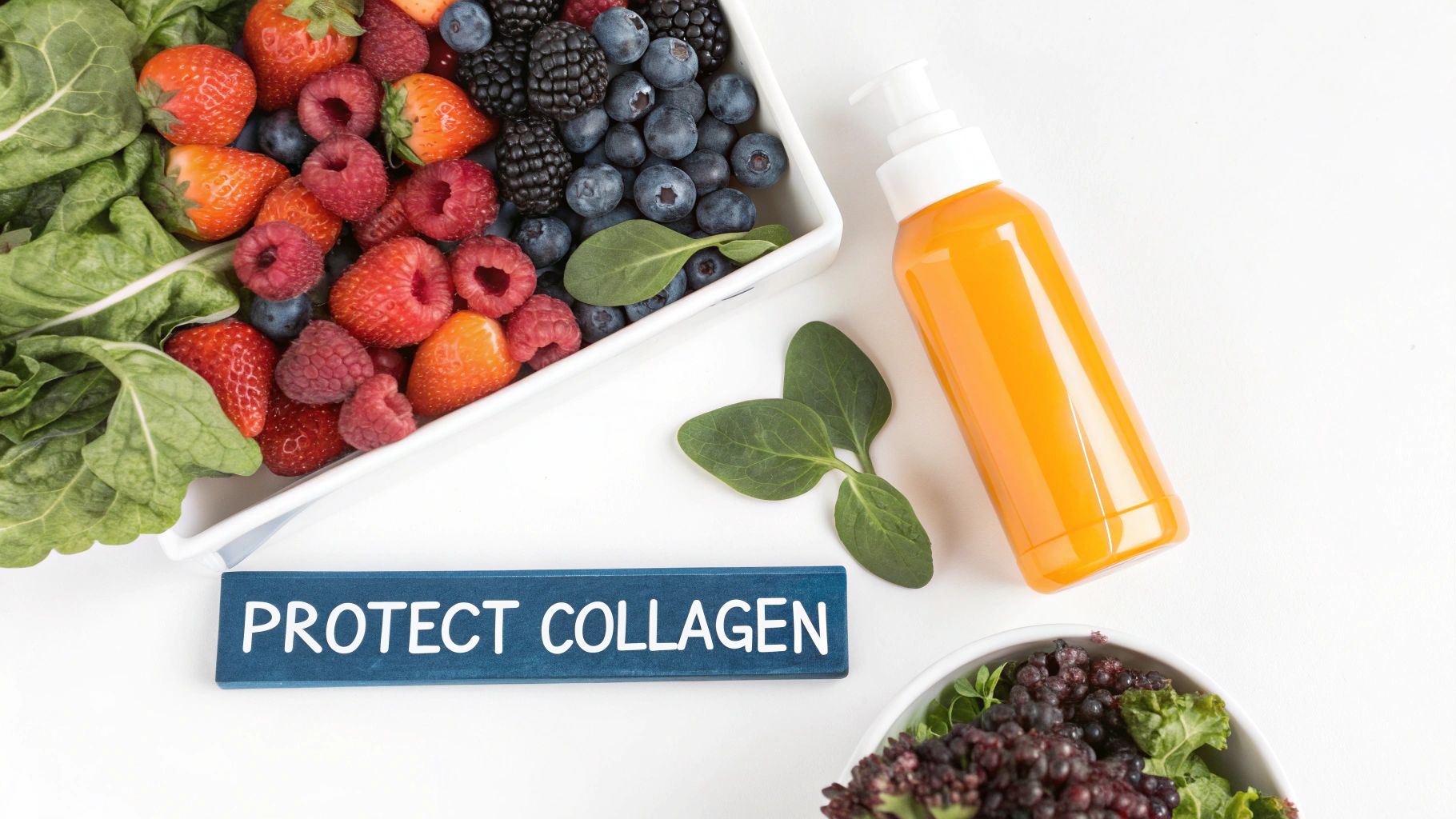
How to Implement This Strategy
Integrating these techniques into your skincare routine is a relaxing ritual that can yield visible results. Consistency is key to seeing benefits.
- Prep Your Skin: Always start with a clean face and apply a high-quality facial oil or serum. This provides the necessary slip to prevent tugging on the skin.
- Gentle, Upward Strokes: Use your gua sha tool or fingertips to apply gentle but firm pressure, always moving in an upward and outward direction to work with lymphatic flow.
- Daily Practice: Dedicate 5-10 minutes each day to your massage ritual. Focus on areas like the jawline, cheekbones, and brow bone.
- Keep it Clean: Be sure to wash your gua sha tool with soap and water after every use to prevent the buildup of bacteria.
Key Insight: The goal is to stimulate, not aggravate. Your skin may look slightly flushed afterward due to increased blood flow, but you should never press hard enough to cause pain or bruising.
While massage enhances the skin’s receptivity, pairing it with topically applied, scientifically backed ingredients can amplify your results. For those looking to maximize skin rejuvenation, combining this physical stimulation with advanced skincare formulations can be incredibly effective. To understand how certain ingredients work at a cellular level, you can explore the science behind the role of peptides in skin health. This synergy of physical and topical therapies creates a comprehensive approach to maintaining a youthful, collagen-rich appearance.
5. Prioritize Adequate Sleep and Stress Management
While diet and topical treatments are vital, your body’s internal state, specifically your sleep cycles and stress levels, plays a profound role in collagen health. The body’s primary repair and regeneration processes occur during deep sleep. It is during these crucial hours that growth hormone is released, stimulating the synthesis of new collagen and repairing damaged tissues, including skin, muscles, and connective tissues.
Conversely, chronic stress and insufficient sleep flood the body with cortisol, a stress hormone that actively breaks down collagen and elastin fibers. This hormonal imbalance not only halts new production but degrades existing structures, accelerating skin aging and weakening joint integrity. Therefore, managing stress and prioritizing restorative sleep is one of the most fundamental natural ways to boost collagen, protecting your investment in other health-conscious habits.
How to Implement This Strategy
Optimizing your sleep and stress is about creating consistent, supportive routines that signal to your body it's time to rest and repair.
- Aim for Quality and Quantity: Target 7-9 hours of uninterrupted sleep per night. Consistency is key, so try to maintain a regular sleep-wake schedule, even on weekends.
- Create a Bedtime Ritual: Establish a calming pre-sleep routine. This could include reading, gentle stretching, or taking a warm bath to signal to your body that it's time to wind down.
- Practice Stress Reduction: Incorporate mindfulness practices like meditation, deep breathing exercises, or yoga into your daily life. Even 10-15 minutes a day can significantly lower cortisol levels.
- Limit Evening Stimulants: Avoid caffeine, large meals, and blue light from screens for at least an hour before bed, as these can interfere with your natural sleep cycle.
Key Insight: Research highlights a direct link between sleep quality and skin health. One study found that poor sleepers showed a 30% greater degree of intrinsic skin aging, including fine lines and reduced elasticity, compared to good sleepers. This underscores sleep's non-negotiable role in cellular repair.
For those in high-stress roles or undergoing intensive physical training, managing cortisol is paramount for both recovery and long-term wellness. A proactive approach to sleep hygiene and stress management ensures your body is in an optimal state for collagen synthesis, supporting everything from skin vibrancy to joint resilience. Adopting these lifestyle changes complements dietary and supplemental efforts, creating a holistic strategy for maintaining youthful vitality.
6. Sun Protection and Antioxidant-Rich Foods
Protecting the collagen you already have is just as crucial as producing new collagen. This is where a two-pronged strategy of diligent sun protection and a diet rich in antioxidants becomes essential. UV radiation from the sun is the number one cause of collagen degradation, triggering a process known as photoaging. It breaks down collagen fibers, leading to wrinkles, sagging, and loss of skin firmness.
This defensive approach makes sun protection and antioxidant consumption one of the most effective natural ways to boost collagen preservation. Antioxidants act as your internal defense force, neutralizing the free radicals generated by UV exposure, pollution, and other stressors before they can inflict damage on your precious collagen network. This combination preserves your existing collagen stores and creates a healthier environment for new synthesis to occur.
How to Implement This Strategy
Combining external protection with internal nourishment is the most powerful way to shield your skin and support long-term collagen health.
- Daily Sunscreen is Non-Negotiable: Apply a broad-spectrum sunscreen with an SPF of 30 or higher every single day, regardless of the weather. This is your first line of defense against UV-induced collagen breakdown.
- Eat the Rainbow: Consume a diverse array of colorful fruits and vegetables. Tomatoes are rich in lycopene, which offers UV protection, while berries and dark leafy greens provide powerful anthocyanins.
- Embrace Green Tea: Incorporate green tea into your daily routine. Its high concentration of catechins, particularly EGCG, has been shown to protect against UV damage and improve skin elasticity.
- Follow an Antioxidant-Rich Diet: Adopting a Mediterranean-style diet, known for its high content of antioxidants from olive oil, fish, vegetables, and fruits, has been linked to significant skin health benefits.
Key Insight: Consistency is the cornerstone of this strategy. A single day of intense sun exposure can undo months of diligent collagen-building efforts. Make sun protection a non-negotiable daily habit, just like brushing your teeth.
While a food-based approach provides a broad spectrum of protective compounds, those living in high-UV environments or seeking maximum anti-aging support may benefit from targeted therapies. Certain antioxidant supplements and direct vitamin injections can provide a higher concentration of protective nutrients, fortifying your body's defenses from the inside out and ensuring your collagen remains strong and resilient against environmental aggressors.
7. Hyaluronic Acid from Natural Sources
Hyaluronic acid (HA) is a powerhouse molecule renowned for its ability to retain water, but its role in skin health extends far beyond simple hydration. It acts as a crucial lubricant and shock absorber in joints and is a key component of the skin's extracellular matrix, the very environment where collagen fibers live and thrive. By maintaining a well-hydrated and structurally sound matrix, hyaluronic acid creates the optimal conditions for collagen-producing cells (fibroblasts) to function efficiently.
This makes boosting your body's hyaluronic acid levels one of the most intelligent natural ways to boost collagen. A properly hydrated dermal environment supports fibroblast health, facilitates nutrient delivery, and protects existing collagen structures from mechanical stress. While the body produces its own HA, this production declines with age, making dietary and lifestyle support increasingly important for maintaining a resilient, youthful complexion.
How to Implement This Strategy
You can support your body's hyaluronic acid levels through specific dietary choices that either provide HA directly or contain the necessary nutrients to stimulate its natural synthesis.
- Incorporate Bone Broth: Slowly simmered bone broth is a direct source of naturally occurring hyaluronic acid, as well as collagen and other glycosaminoglycans. Including it in soups, stews, or sipping it on its own is a traditional and effective method.
- Embrace Root Vegetables: Starchy root vegetables like sweet potatoes and jicama are rich in magnesium and potassium, minerals that are essential for the body's own HA production.
- Focus on Soy: Soy products such as tofu, tempeh, and edamame contain isoflavones, which are phytoestrogens that have been shown to help increase the body's hyaluronic acid synthesis.
- Eat Leafy Greens: Spinach, kale, and other dark leafy greens are excellent sources of magnesium, a critical mineral that acts as a cofactor for the enzymes involved in creating hyaluronic acid.
Key Insight: Staying consistently hydrated is non-negotiable. Hyaluronic acid works by binding to water, so drinking enough water throughout the day is essential to unlock its full plumping and collagen-supporting potential.
For those seeking to ensure their cellular environment is perfectly primed for maximum collagen and hyaluronic acid synthesis, certain advanced therapies can provide foundational support. Peptides like GHK-Cu are known to stimulate both collagen and HA production within the skin. If you are exploring comprehensive anti-aging strategies, you might research GHK-Cu peptide wholesale pricing to understand the options available for advanced protocols. A food-first approach builds the base, while targeted compounds can significantly amplify the results.
8. Intermittent Fasting and Autophagy
Intermittent fasting is a powerful metabolic tool that can trigger autophagy, a Nobel Prize-winning cellular process. Autophagy is essentially your body's internal cleanup and recycling system. During fasting periods, your cells begin to clear out old, damaged, and dysfunctional components, including fragmented collagen fibers that contribute to wrinkles and loss of skin firmness. This clearance makes way for cellular regeneration and the synthesis of new, high-quality proteins.
Activating this process is one of the most sophisticated natural ways to boost collagen because it works from the inside out. Instead of just adding new building blocks, intermittent fasting helps remove the old, damaged structures first, creating a better foundation for new collagen to form. This controlled stress response supports not only skin elasticity and joint health but also overall cellular integrity and longevity, as championed by researchers like Dr. Yoshinori Ohsumi and Dr. Jason Fung.
How to Implement This Strategy
Integrating intermittent fasting requires a structured approach to your eating schedule. The goal is to create a consistent window of time where your body is not digesting food, allowing it to shift into a state of repair.
- Start with the 16:8 Method: This is one of the most popular and sustainable methods. Fast for 16 hours and eat all your meals within an 8-hour window, for example, from 12 PM to 8 PM.
- Stay Hydrated: Drink plenty of water, black coffee, or herbal tea during your fasting period. Hydration is crucial for cellular function and can help manage hunger.
- Break Your Fast Wisely: When your eating window begins, break your fast with a nutrient-dense meal rich in protein, healthy fats, and the vitamins necessary for collagen synthesis, like vitamin C and zinc.
- Be Patient and Consistent: It can take a few weeks for your body to adapt. Many practitioners report noticeable improvements in skin clarity and firmness over several months of consistent practice.
Key Insight: The benefits of fasting are cumulative. Consistency is more important than intensity. Starting with a shorter fasting window, like 12-14 hours, and gradually extending it can make the process more manageable and effective long-term.
Intermittent fasting provides a unique pathway to cellular renewal that complements dietary and topical strategies. By prompting your body to self-cleanse, you are enhancing its innate ability to rebuild and rejuvenate. For those interested in a deeper exploration of this mechanism, you can learn more about how autophagy is key to unlocking youthfulness. Always consult with a healthcare provider before making significant changes to your diet or lifestyle, especially if you have underlying health conditions.
Natural Collagen Boosting Methods Comparison
| Item | Implementation Complexity | Resource Requirements | Expected Outcomes | Ideal Use Cases | Key Advantages |
|---|---|---|---|---|---|
| Vitamin C Rich Foods | Low | Easily accessible foods | Supports collagen synthesis and antioxidant protection | Daily diet supplementation | Natural, antioxidant-rich, immune support |
| Bone Broth Consumption | High (12-24 hrs prep) | Quality bones, long simmering | Provides direct collagen peptides and minerals | Joint health, gut support, cooking | Direct collagen source, versatile ingredient |
| Collagen-Supporting Herbs (Gotu Kola, Horsetail) | Moderate | Herbal supplements or teas | Stimulates collagen production, antioxidant effects | Herbal medicine, supplements | Plant-based, multiple mechanisms, traditional use |
| Facial Massage and Gua Sha | Moderate | Tools (stones, rollers) | Improves circulation, may stimulate collagen production | At-home skincare routines | Immediate skin tone improvement, relaxing |
| Adequate Sleep and Stress Management | Moderate to High | Lifestyle changes | Enhances natural collagen repair via hormonal balance | Overall health, skin regeneration | Root cause approach, no cost, broad benefits |
| Sun Protection and Antioxidant-Rich Foods | Low | Sunscreen, antioxidant-rich foods | Prevents collagen breakdown, supports synthesis | Daily skin protection and diet | Preventive, well-supported, affordable |
| Hyaluronic Acid from Natural Sources | Low to Moderate | Specific foods (bone broth, veggies) | Hydrates skin, supports collagen matrix | Skin hydration and connective tissue support | Natural hydration, supports collagen environment |
| Intermittent Fasting and Autophagy | High | Lifestyle change, time management | Cellular cleanup, stimulates new collagen synthesis | Cellular health, longevity, skin texture | No supplements needed, multiple health benefits |
Synthesizing Your Strategy for Lasting Radiance
Boosting collagen is not a passive pursuit or a single-shot solution. As we've journeyed through these eight pillars, it's clear that achieving vibrant, resilient skin is about creating a comprehensive, synergistic lifestyle. The path to preserving your body's most crucial protein is paved with intentional daily choices, where each action supports and amplifies the others. You are not just following tips; you are building a personalized architecture for long-term cellular health and vitality.
Think of it as a holistic ecosystem. The vibrant, vitamin C-rich foods you consume lay the foundational groundwork, providing the essential cofactors for collagen synthesis. Bone broth and collagen-rich foods then deliver the direct amino acid building blocks, like glycine and proline, that your body needs to construct strong collagen fibers. This internal nourishment is then protected by your external shield: a diligent sun protection routine and a diet rich in antioxidants that neutralize free-radical damage.
From Foundational Habits to Advanced Optimization
Mastering these foundational elements creates a powerful baseline for collagen preservation. However, to truly elevate your results, you must integrate practices that actively stimulate and renew. This is where lifestyle habits become non-negotiable.
- Stimulation and Circulation: Facial massage and Gua Sha are not just relaxing rituals. They are targeted physical practices that boost blood flow, delivering oxygen and nutrients directly to skin cells and stimulating the fibroblasts responsible for collagen production.
- Rest and Repair: Adequate sleep and effective stress management are the unsung heroes of collagen health. During deep sleep, your body enters a state of repair, producing human growth hormone (HGH) that is critical for tissue regeneration. Chronic stress, conversely, floods your system with cortisol, a hormone known to actively break down collagen.
- Cellular Renewal: Practices like intermittent fasting can trigger autophagy, your body's innate cellular cleanup process. This mechanism clears out damaged cellular components, including degraded collagen fibers, making way for new, healthy cell formation.
By weaving these elements together, you move beyond simple prevention and into active rejuvenation. You're not just protecting what you have; you are actively encouraging your body to rebuild and fortify its structural integrity. The value in this approach extends far beyond aesthetics. Strong collagen supports joint health, gut integrity, and overall tissue resilience, benefiting athletes, active individuals, and anyone seeking to improve their long-term wellness.
The true power lies in the synergy of these methods. A diet rich in collagen precursors is made more effective by the circulatory boost from facial massage. The benefits of a good night's sleep are protected by managing daytime stress. Combining these natural ways to boost collagen creates a powerful, self-reinforcing cycle of health and renewal, putting you in direct control of your aging process and unlocking a lasting, authentic radiance that truly comes from within.
Ready to amplify your natural efforts with targeted, science-backed support? Elite Bioscience offers advanced peptide and vitamin protocols specifically designed to provide the precise building blocks your body needs for optimal collagen synthesis and tissue repair. Explore how our specialized therapies can accelerate your journey to enhanced vitality and skin health at Elite Bioscience.
QUICK SEARCH
Make an account today to start your journey towards a better and healthier lifestyle.
